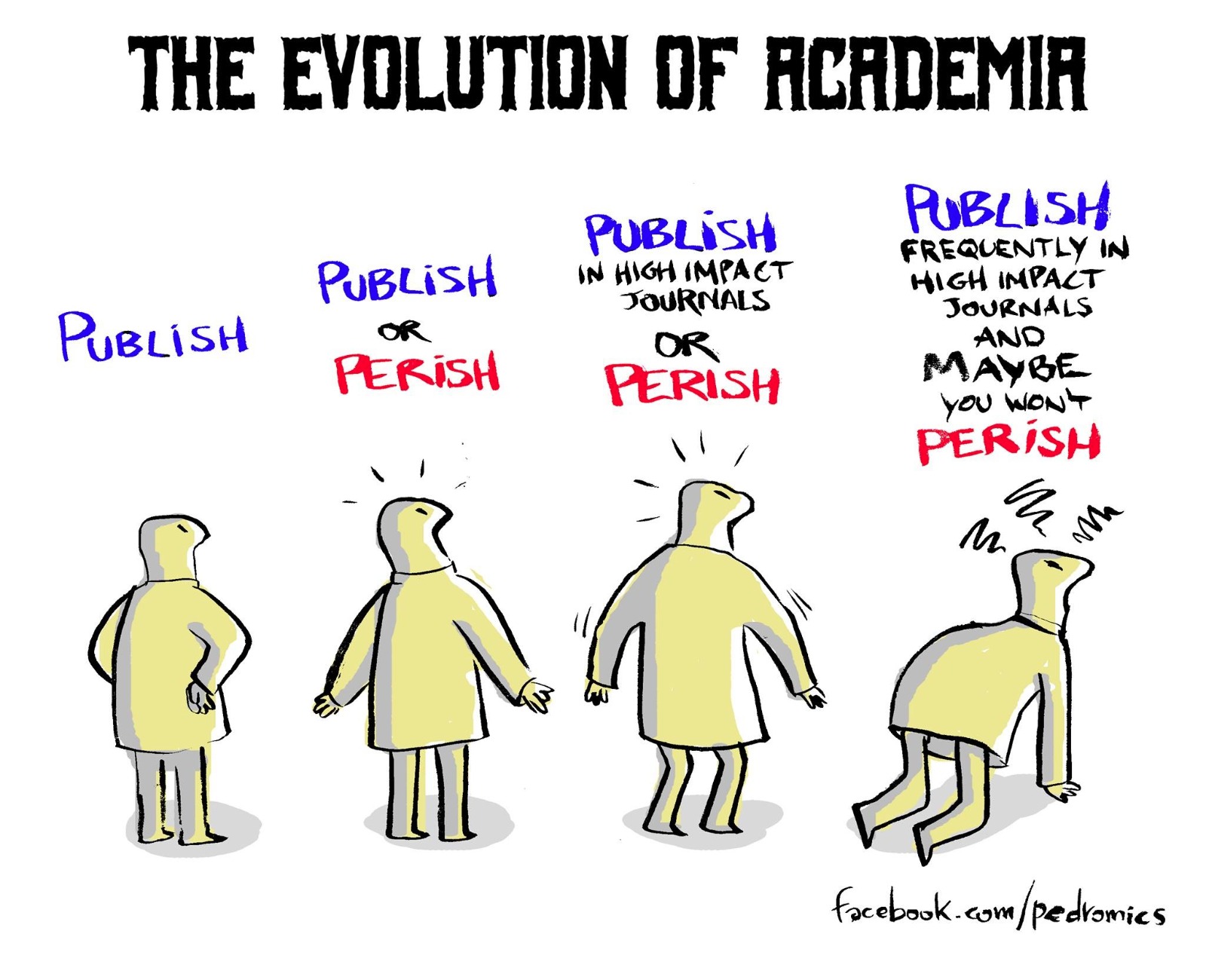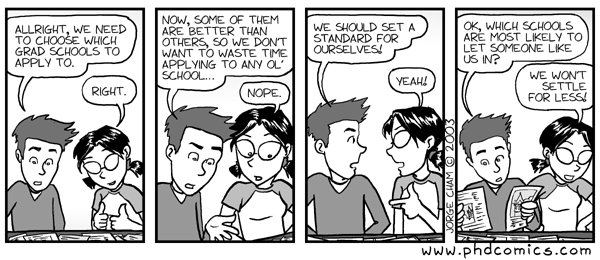Reflections on my CS PhD Application Process
I’m glad it’s over.
I applied for CS Ph.D. programs this past fall and had interviews with schools from late December all the way to March. Now that the semester has ended, I decided to put down some reflections on this process. This post is not intended to be the most comprehensive CS Ph.D. application tutorial in the world, but merely a half-guide half-memoir of journey towards a PhD. Of course, you should take this post with a grain of salt, since I don’t work on admission committees, and am no where near an expert in the application process.
On Research
The singly most important factor in a Ph.D. application is perhaps your research experience. The general thumb is ‘’the earlier, the better". You should absolutely start getting involved in research as early as possible. Throughout this experience, you will eventually find out if research is your thing and whether you want to continue the path in academia.
The general rule of thumb is ‘’the earlier, the better". Practically speaking, you will likely have something to put on your resume or your statement of purpose by the time you start Ph.D. applications. Since grad school is all about research, having as many research experiences as possible is only going to make your profile look stronger.
The earlier, the better
More importantly, grad school applications, especially in Computer Science, has become extremely competitive over the years. The admission rate for most top CS departments is well below 10 percent. Having publications, or even just research experiences, is likely gonna decide whether you are getting accepted. To some extent, “publish or perish” also applies to Ph.D. application.

I had friends who asked me whether they should wait until junior or senior years to get started in research because by then they will have taken enough courses and are better equipped with the background. My suggestion is no. First, part of research is about learning: you settle on a problem and you find ways to solve it. Learning happens throughout this process. My advisor Chris always says you learn more by doing research. My personal experience has reenforced this statement. Second, there simply might not be enough time for you to finish the research project by the time application process starts. It’s possible to pull a rabbit out of the hat in some areas like theory or machine learning. But for areas like systems, the sheer amount of workloads makes submission cycle really long. This is exacerbated by the relatively small number of top conferences. In addition, there will be several months before you are notified of the final decision.
For example, my first GPU project took more than a year to finish. It was then rejected and cost another several months before it was published. By the time my application started, my paper was still under submission and I didn’t hear anything back until late January.
Another problem people asked me is how to pick a research area in the first place. I use a small trick I learned from a post on Quora: figure out what you spend most time on. For a really long time, I thought I would eventually do something related to deep learning, because, well, that’s what everybody is doing. However, I found myself spending much more time browsing through LWN.net or Linux kernel code than actual deep learning. So I decided doing systems suites me better.
Picking Schools
So I’ve decided to apply for PhD, it’s time to pick which schools to apply to. Ph.D. is equivalent to research apprenticeship. Therefore, the application process is very much faculty-oriented. I highly recommend csrankings. It is capable of filtering out a lot of unwanted information and focus on your research interests quickly. It’s much quicker and more convenient to see all names in one place than browsing through every person’s name in every university. But you should still take a loof at each university’s faculty list because csrankings might not contain the most up-to-date information.

In terms of how many schools to apply, my suggestion is “the more, the better”. Statistically speaking, more application increases your chance of getting accepted. The major problem is the application fee and the need to tailor each SOP to different schools. I applied 20 programs, all in U.S.. This is way above the average number and I don’t really recommend most people doing it. However, applying more programs does gave me several interviews from schools I thought weren’t the best fit. For example, there is one AP who just came to the university and has research interests closely matching mine, but his personal information is not yet reflected in both csrankings and the school’s website. Another interviews I got are from a professor coming from a more theoretical background but is in need of students with more system skills to build the underlying infrastructure.
Statement of Purpose
You will need to submit a SOP to every school you apply to. There are many tutorials online on how to come up with the best SOP so I won’t go over them. In general, I think there are two things to consider:
- Don’t be creative, be simple.
- Focus on research.
- Getting as many people reading your draft as possible.
If you google “what to avoid in a PhD SOP”, you will be advised to not say something like how you started programming at age 4. This is not the same as your college application essays so don’t be smart about it. Simply stating your goals and interests is more than enough. My SOP opening goes like:
After spending three years in academic research, I see my goal to seek a Ph.D. in Computer Science, more specifically in systems, as a continuation of my increasing involvement with the field, and as a requirement to pursue my research interests and solve related problems in systems as a professor. In particular, I am interested in operating systems, heterogeneity, networking, machine learning systems, and architecture.
Avoid writing every accomplishment in your life. I get it, everyone wants to show off their proud moments. I made the mistake in my first draft by going over all my research projects, including those outside of systems, as well as my side projects. In the end, my essay turned into a hodgepodge with no real focus. It also goes way over the page limit. In the end, I had to cut down all stuffs that are not ‘‘system-related" to make rooms for more important contents. If you want a sample, I’d be glad to share you a copy upon request.
The Interview
Now that you submitted all the applications, and interviews start to come in. My general suggestion for preparing for an interview is to keep things simple. First, there are only 30 minutes. Your priority, as a student, is to make the most out of this 30 minutes. It’s important to discuss your research and know what you are talking about, but don’t go over too much into the details because
No body is able to understand all the technical details under 30 minutes.
The high level idea is generally much more important. If you can’t describe it under a few minutes, you likely don’t really know the project very well.
If the professor is interested in digging more into the project, he/she will ask more questions. This is good because it can turn an interview into a discussion, which is both more interactive and less intimidating. Nobody likes a 30-minute monologue.
The purpose of the interview is to find whether there is a match of interests and whether this interest is mutual. You should also reserve some time to ask your own questions.
Other Thoughts
I don’t really recommend taking too many classes while doing research projects. Research is very time-consuming and can take away a lot of sleep. When I was first semester in working on my GPU project, I was trying to double major, taking all the hard classes, TAing an OS course, and juggling around all sorts of stuff. Anxiety became an issue and I wasn’t able to get enough sleep. My productivity took a hit and resulted in my first paper being rejected. If I could travel back in time, I’d rather do less to achieve more.
If you decide to email potential advisors, keep the message short and go straight to the point. Avoid American novels. Assistant professors or professors that explicitly wrote on their page about students reaching out to them have much higher likelihood of replying your messages, because they are constantly looking for students to expand their groups.
Keep up with the application status, but do not check TheGradCafe too often because it can get addictive:)
May the force be with you 🤘.